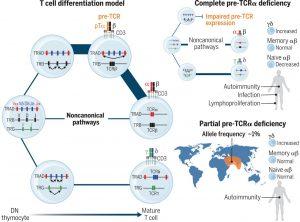In animal models, particularly those carried out in mice, pre-TCRα chains have been identified as essential to the development of αβ T-cells in mice. In a recent study, researchers aimed to establish this in humans, something that has not been done (Figure 1).

Figure 1: Functional αβ T cells and late-onset immunological conditions in humans with complete or partial inherited pre-TCRα deficiency. Although complete pre-TCRα deficiency is very rare, partial pre-TCRα deficiency is common in South Asia and the Middle East, affecting about 1 in 4000 individuals. DN, double-negative. [Figure created with BioRender.com.]
Loss of pre-TCRα in mice can cause up to a 95% decrease in the number of αβ T-cell precursors. Mice with very few TCRαβ cells detected in the lymph nodes do remain healthy however, they fail to be challenged with pathogens.
To determine whether inherited pre-TCRα deficiency has any effect in human beings, 10 patients with rare biallelic loss-of-function PTCRA variants were looked at in this study. 6 out of the 10 patients were found to remain irrespective of their age while the remaining 4 reported having infections or some form of autoimmunity that began between the ages of 13 and 25. All patients had low αβ T-cell counts from the childhood, however their memory αβ T-cell counts were normal.
The two most common PTCRA variants that are linked to partial pre-TCRα deficiency in homozygotes were identified to occur very rarely; the p.Tyr76Cys PTCRA variant was found to be homozygous in about 1 in 73,000 individuals from Africa while the p.Asp51Ala variant was homozygous in about 1 in 4000 people from the Middle East and South Asia. Altogether, this has led Meterna and colleagues to conclude that a complete inherited pre-TCRα deficiency is not only rare in human beings but also not very severe since individuals are able to reach adulthood without very extreme signs of underlying immune-pathophysiology.
Journal article: Materna, M., et al., 2024. The immunopathological landscape of human pre-TCRα deficiency: From rare to common variants. Science.
Summary by Vanessa Mwebaza Muwanga
